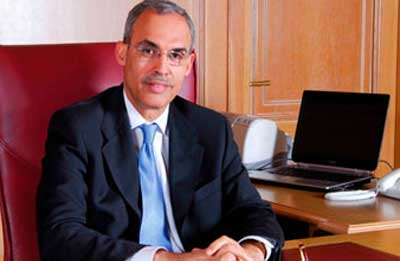
Bahrain cenbank to demand strict rules from banks
Manama, March 6, 2013
Bahrain's central bank will require local lenders it sees as key to the stability of the Gulf country's banking system to take more steps to ensure their soundness, its Governor Rasheed al-Maraj said on Tuesday.
The kingdom of 1.3 million people has based its economic strategy on becoming a regional financial hub as it lacks the petrodollar wealth of its Gulf neighbours.
The financial industry makes up around 17 per cent of the $29 billion economy.
But two years of social unrest have weighed on the banking sector, with annual lending growth slowing to 7.8 per cent in November, the lowest level since August 2011.
Maraj did not say which banks the central banks defines as key to the country's banking stability or give details of the steps the central bank will ask them to take.
"This is a process that will have to take time and we will have to engage with those banks that have been selected," he said while addressing the gathering at The Euromoney Bahrain Conference held at Ritz-Carlton Hotel on Tuesday.
Ahli United Bank is Bahrain's biggest retail bank by assets, followed by BBK and National Bank of Bahrain.
Maraj said Basel III, like most regulations, was about trade-offs. "It raises many challenges to finding the optimal point for any regulatory proposals. For example the CBB must try to ensure that all banks have an adequate level of capital relative to their risk profile," said the CBB chief.
"Linked to this is the need to provide a measure of capital that is realistic and comparable over time and between banks. Most observers agree that comparability provides the confidence that the capital requirements are reasonable. Achieving that comparability to the satisfaction of all stakeholders is very challenging," he observed.
To address these challenges, Maraj said the CBB has, as normal, initiated a programme of communicating closely with its licensees about how Basel III will affect their business.
"These negotiations cannot be concluded overnight. The outcomes are crucial to the sustainability of the financial sector, and therefore to the economic stability of the country," he explained.
"That is why the CBB has embarked upon this programme of discussions at this stage. The early signs are encouraging insofar as each stakeholder understands the importance of what we are trying to achieve, and as the dialogue proceeds will ultimately find a workable, sensible, way forward," he added.
Maraj said there was at least one bank merger in the making in non-Opec Bahrain, which he welcomed, but he declined to give details.
"There's no room for small banks. The economic atmosphere is challenging, and the competition in the market is becoming very fierce," he told a financial conference in the capital Manama.
Al Salam Bank said in January it was in merger talks with an unnamed regional bank, while Gulf Finance House said it was studying options to merge its unit, Khaleeji Commercial Bank, with other Bahraini banks.
The central bank is not encouraging large borrowing by the government to finance its budget deficit but it will try to continue with bond issues necessary to manage liquidity and push for a lower fiscal gap, Maraj said.
"Over the years, we have managed to issue different types of instruments, whether conventional or unconventional, and we will continue with this trend but taking also the view that some of these issues will have to be moderated as we don't want to build a huge sovereign debt," he said.
Bahrain, which is expected to get $1 billion in aid a year from its wealthier Gulf neighbours over the next 10 years, last sold a $1.5 billion, 10-year bond in June. It is the only nation out of the six-member GCC facing a fiscal deficit in 2013.
A Reuters poll in January forecast Bahrain's budget gap would widen to 4.5 per cent of economic output in 2013 from an estimated 2.7 per cent last year.
Bahrain needs oil prices to average $122 per barrel this year to be able to balance its budget, a finance ministry official estimated in November, by far the highest level in the Gulf.
It depends on crude from an oilfield it shares with Saudi Arabia for some 70 per cent of its budget revenue.
The country's public debt rose to 35.5 per cent of economic output at the end of December 2012 from 29.1 per cent in the same month a year before, latest central bank data show.
Maraj also said he saw no change in monetary policy settings for now: "I don't expect any change in our interest rate policy, at least for the time being."
Bahrain, which pegs its dinar to the US dollar, has kept its key rates, the repo and one-week deposit, unchanged at 2.25 percent and 0.50 percent, respectively since September 2009.-Reuters and TradeArabia News Service







